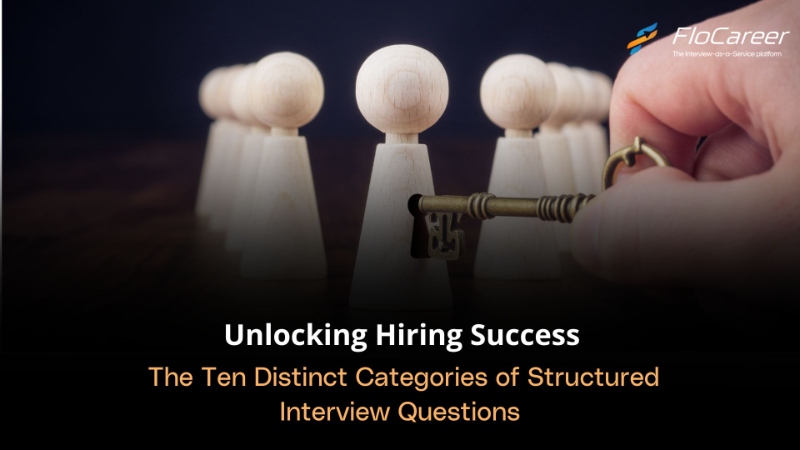Unlocking Success: The Ten Distinct Categories of Structured Interview Questions.
Structured interviews are the bedrock of a comprehensive and unbiased hiring process. To harness their full potential, organizations deploy a diverse array of questions designed to evaluate candidates objectively. These questions, strategically categorized, ensure a thorough assessment of candidates' qualifications, skills, and cultural fit. In this exploration, we delve into the six distinct categories of structured interview questions, shedding light on their significance and impact on the hiring journey.

Read: Mastering the Art of Conducting High-Quality Interviews
Distinct Categories of Structured Interview Questions.
1. Basic Information Questions: Unveiling the Candidate's Professional Canvas
- The Foundation of Understanding
Basic Information Questions serve as the foundation of a structured interview. They are meticulously crafted to unveil key aspects of the candidate's professional canvas, including their educational background, work experience, and professional certifications.
By garnering insights into the candidate's journey, recruiters establish a baseline understanding, enabling them to tailor subsequent questions to the individual's unique trajectory.
2. Resume Questions: Navigating Through Professional Narratives
- A Deeper Dive into Experience
Resume Questions pivot towards a deeper exploration of the candidate's professional narrative. Interviewers use these questions to seek elucidation on specific experiences, projects, or accomplishments highlighted in the candidate's resume.
This category ensures a nuanced understanding of the candidate's contributions, shedding light on the depth and impact of their past roles.
3. Situational Questions: Probing Problem-Solving and Decision-Making Skills
- Evaluating Practical Aptitude
Situational Questions immerse candidates in hypothetical scenarios, assessing their problem-solving and decision-making skills. These questions gauge how candidates approach challenges, offering insights into their analytical prowess and strategic thinking.
By simulating real-world scenarios, recruiters gain valuable foresight into a candidate's ability to navigate the complexities of the role.
4. Weakness Questions: Illuminating Growth Mindsets
- Turning Vulnerability into Strength
Weakness Questions transcend the traditional interview dynamic by encouraging candidates to reflect on areas of improvement. This category aims to illuminate a candidate's self-awareness, resilience, and commitment to continuous growth.
Recruiters value responses that showcase a constructive approach to addressing weaknesses, emphasizing a growth mindset within the candidate.
5. Contribution Questions: Evaluating Team Dynamics and Impact
- Unveiling Collaborative Abilities
Contribution Questions delve into the candidate's potential contributions to a team or organization. By exploring past experiences of collaboration, leadership, and impact, recruiters assess the candidate's ability to align with and enhance team dynamics.
This category places a spotlight on the tangible value a candidate can bring to the collective success of the organization.
6. Abstract Questions: Assessing Critical Thinking and Creativity
- Navigating Uncharted Waters
Abstract Questions steer away from the conventional, prompting candidates to engage in abstract and creative thinking. These questions assess critical thinking skills, adaptability, and the capacity to navigate uncharted waters.
By challenging candidates to think beyond the expected, recruiters gain insights into their ability to innovate and approach challenges from unconventional perspectives.
Read: Achieving Higher Interview Quality
7. Cultural Fit Questions: Assessing Alignment with Organizational Values
- Harmonizing with Company Culture
Cultural Fit Questions gauge how well candidates align with the values, mission, and culture of the organization. These questions explore the candidate's work preferences, communication style, and collaboration tendencies, ensuring a harmonious integration into the existing team dynamics.
By delving into cultural alignment, recruiters ascertain whether a candidate is not only qualified for the role but also poised to thrive within the organizational ecosystem.
8. Conflict Resolution Questions: Uncovering Resolution Strategies
- Navigating Workplace Challenges
Conflict Resolution Questions navigate the candidate's approach to handling workplace conflicts. These questions aim to uncover their conflict resolution strategies, communication skills under pressure, and ability to foster positive outcomes in challenging situations.
Understanding how a candidate navigates conflicts provides valuable insights into their interpersonal skills and their potential contributions to a healthy and collaborative work environment.
9. Adaptability Questions: Probing Flexibility and Resilience
- Thriving in Dynamic Environments
Adaptability Questions assess a candidate's flexibility and resilience in the face of change. In today's dynamic work environments, the ability to adapt to new circumstances and pivot when necessary is crucial. Recruiters use these questions to evaluate how candidates approach change and uncertainty.
Candidates who showcase a high level of adaptability signal to recruiters that they can thrive in environments where agility and resilience are paramount.
10. Long-term Goals Questions: Aligning Career Trajectories
- Mapping Career Aspirations
Long-term Goals Questions explore a candidate's career aspirations and how they align with the trajectory of the organization. By understanding a candidate's long-term vision, recruiters can assess whether the role aligns with the candidate's ambitions and whether the organization can provide a conducive path for their professional growth.
This category ensures a strategic alignment between the candidate's career goals and the long-term objectives of the organization.
Flocareer: Elevating Structured Interviews to Unprecedented Heights
As organizations strive for excellence in their hiring processes, the inclusion of these additional question categories enhances the depth and breadth of structured interviews. Flocareer, with its expansive network of interviewers, adapts seamlessly to incorporate these diverse question types, providing organizations with a comprehensive and tailored approach to candidate assessments.
Through Flocareer's interview outsourcing services, organizations not only optimize the structured interview process but also gain access to a wealth of expertise in navigating the intricacies of each question category. This strategic collaboration ensures that interviews are not merely a selection tool but a transformative process that aligns organizational goals with individual aspirations.
In essence, the evolution of structured interviews with these additional question categories, coupled with Flocareer's expertise, heralds a new era in hiring practices, where precision, fairness, and strategic alignment converge to unlock unprecedented heights of success.


